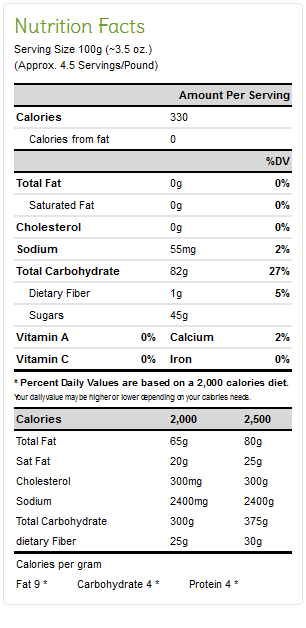Origins: Thailand
Because heat is used during the dehydration process, pineapple loses much of its nutrient content when it is dried. Water-soluble vitamins, such as vitamin C, deteriorate rapidly, as do minerals like potassium and calcium, which tend to drop by at least 50 percent. Dried pineapple holds onto its sugar content, however, and is two to three times higher in calories than raw pineapple. As a snack, it is an effective low-fat way to get some quick energy, but if you are trying to watch your weight or your blood sugar level, eating fresh pineapple or a lower-sugar fruit in moderation is a healthier option.
Sugar
When fruit is dehydrated, water is removed from it, leaving it higher in nutrients per gram but also higher in sugar. A cup of raw pineapple is already sweet, containing 16 grams of sugar before it is dehydrated and its sugar content is concentrated. Many commercial manufacturers of dried pineapple coat it with granulated sugar, further increasing its sugar content to about 13 grams per piece. Because you will eat several pieces at a time, snacking on dried pineapple is similar to eating candy. If you have diabetes or are trying to avoid excessive sugar, avoid this food.
Manganese
The Institute of Medicine recommends that men get 2.3 milligrams of manganese, a mineral that helps develop strong bones and connective tissues, each day, while women need 1.8 milligrams. Two medium-sized slices of dried pineapple give you about 75 to 80 percent of this amount, according to the Linus Pauling Institute. If you are at risk for osteoporosis, adding pineapple to your diet may help protect your bones from losing density.
Bromelain
Pineapple contains a mixture of enzymes called bromelain, which scientists have identified as a treatment for inflammation and indigestion. Bromelain helps your body digest protein, according to the University of Maryland Medical Center. Nutritional supplement and pharmaceutical product manufacturers commonly isolate bromelain and sell it as a remedy for sinus inflammation and post-surgery swelling. Because dried pineapple contains bromelain, adding it to your diet may offer you some anti-inflammatory benefits.
Vitamin C
Although dried pineapple offers some nutrient benefits, the cost is a large amount of sugar and calories. A 3-ounce serving of dried pineapple provides about 50 percent of the vitamin C you need each day, while the same amount of fresh raw pineapple gives you more than 100 percent. Similarly, a cup of raw pineapple contains 18 micrograms of folate, which is virtually depleted by dehydration. Antioxidant compounds protect your healthy cells from free radical destruction, preventing premature aging and the development of diseases.

